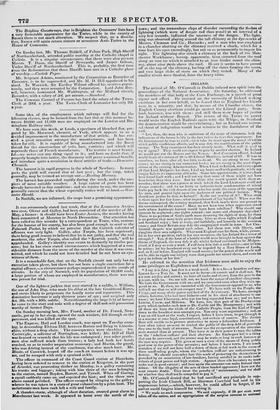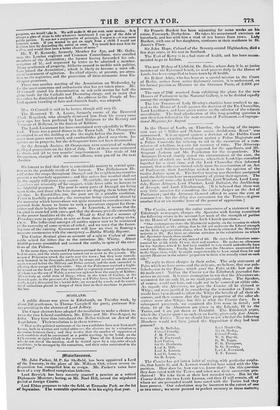IRELAND.
The arrival of Mr. O'Connell in Dublin infused new spirit into the- proceedings of the National Association. On Saturday, he addressed the members of that body at the Corn Exchange, in a speech of great vigour and effect. tie insisted on the necessity of Ireland lir aking exertions in her own behalf, as he feared that in England her fliends were in a minority, and that, by means of the Chandirs clause, the English County elections would go against the Liberal party. Scot- land, however, was with them n : and still 'there were hopes of justice for Ireland without Repeal. The return of the Tories to power would unite the English Radicals again with the Whigs ; in Scotland the demonstration would be overwhelming ; but in Ireland one tad vets. sal shout of indignation would bear witness to the fearfulness of the evil.
" Let, then, the mall who is ambitious of the name of statesman, look the
indications of the future lieldly in the face loefoore he to ies this experiment. Let the Government be true to itself—let it take its stand upon the moral elevation which public confidence affords, and it may defy the macloinations of the public enemy. The Tory ex pei inient has been already made. What will it avail to try it again? They could not expect to gain by another election. In Ireland we would put out the Bruens and the Vese)s. A r.d if occasion offered, behind would Imast of a return of 80 to 90 Libel al Members, instead of 67. If true to (ourselves, we have, after all, but little to dread. We are strong in our honest rause; we ale strong in our numei ical [Hosts; we are strong in the good dispo- sitions of the existing Administration. When I look to Ireland, and contemplate all that Lord Alidgrave has done, I feel my heart swell with gratitude, while my tongue fails in its expression of thanks. Some late appointments, it is true, have been found fault with ; and I will not say that senile of them might not have heron better than they were. But let those who would quarrel with them re- member, that there WaS a power at wook which the Lord-Lieutenant could not
always control ; and let no hasty or indiscriminate condemnation of trivial faults pay back the rich deserts of one who has niade the cause of the oppressed his own, and poured light upon the darkness of our political horizon. Why should not justice be done to Ireland ? Is she not worthy of it ? What stain is there upon her fair fame—what impeachment of her loyalty? When was the throne endangered, the country menaced, that Irish bear ti were not prompt to the sustainment of the cause ? Have we not heen true when oppressinn sowed seeds whose legitimate harvest would have been rebellion ? Why should our interests be neglected—our rights refused—our name and character degraded ? There is no portion of God's earth more deserving the rights of man, ton' there is no portion that more truly prizes them. Give us those lights which England and Scotland enjoy ; link us teuly, and faithfully, and honestly in the common cause ; and Great Britain may defy the congregated world in arms. Let Con- tinental despots war against each other. Let them war with liberty, and slaughter their own subjects. What need England care for them, while, power- ful in her own position, rich in her own resources, she has Ireland for a tower of strength ? Yes, if the force of a hostile world were braught to bear against the throne of England, she may defy it all, whilst Ireland continued to be Magra- eized, if I may so coin a word. / will turn hitn into a verb active—and let him be active; let his beneficent sway not he impeded by a Tory House of Lords, and, as I said before, England will stand secure; for the power of the world will not be able to ripple one solitary wave that guards her sacred shore, and casts it9 spray in tribute at her feet."
He referred to the assertion that Irishmen were unfit to enjoy the same privileges as Englishmen and Scotchmen-
" I say it is false; but that is a weak word. It is a lie—a heartless and ma- lignant lie—a Tory lie. It must not he borne—it cannot, and it shall not. We tee now 'soli rhty and united ; we have all ranks and classes, from the peer to the paQant, with us. On our roll, too, we have the names of excellent clergymen. We have the Government with us—and we succeeded even when they were op- posed to us. It, then, we succeeded with the Government opposed to us, who will tell me that we will not conquer now ? We have with us the People, the Clergy, and many of the purest and best of the Aristocracy. We have, amongst others, Leinster, who hurl been hitherto cool in his show of attachment to our cause; we have Cloneurry, who was too long separated from us ; and we have Leitrim. Carew, and Miltown. We have, too, that part of the Presbyterian parry which includes such men as Dr. Carlile and Dr. Montgomery ; and with all these we have the wt.ole of the Catholic People, born the Earl of Fingal down to the lounoblest man amongst you. You only want organization ; and, le I am an old hand at the work, I expect, before I leave town, to get through it in a manner at once legal, constitutional, and certain of success. The Justice Rent will enahle Ins No procure protectioa to many a defenceless Irishman. I have often taken occasion to remind the public of the deep debt of gratitude they owe to the body. of attornies. Never was the co-operation of the attormes more wanted than at present. They have it in their power to turn the tables 'on die rebellion ruffians' and their abettors. An Exchequer bill is a thing that can be answered, and the answer may be made as long in each instance its the ease may require. This gives at once a view of the means of doing public gond now in the power of the attornies.; and before I leave town, I am much mistaken if we will not have half-a-dozen of diem at full work in the cause of those unoffending people, whom the rebellion ruffians' are endeavouring to destroy. We should reniember how this mode of protecting the deiencele.ss F provoked by an association of law-breakers, having enrolled in its ranks lath- viduals of great power and high station. Against these vile barrators we murit make war in good earnest ; and here again the attornies can make Ireland their details. Of the illegality of the acts of these banded oppressors I have not the most remote doubt. They incur the senalry of maiutenance,' and we shall see whether they shall not be compelled to pay it."
Mr. O'Connell denied that he had sacrificed any principle in sup- porting the Irish Church Bill, as Sharman Crawford had said in his ungenerous letter,—which, however, he could afford to forget, if its author could forgive himself for writing it. We made no such compromise. We said expressly, if 30 per cent. were taken off the entire, and an appropriation of the surplus reveuue to national
purposes, we would take it. We will make it 40 per cent, next session. It is always a plan of nfme to take whatever instalment I cm get of the debt of public juslice. It was not a compromise of principle, I repeat it—it was mere common sense. If you wanted to get an apple from a child, I would not frighten him by demanding the entire at once. You would first Coax him for a slim, and would then have a better chance of more." Mr. '1'. F. Kennedy, formerly Member for Ayr, and Mr. Gallo. way, the London engineer and Common Councilman, were enrolled members of the Association; the former having forwarded his sub- scriotion of U., and requested by letter to be admitted a member. 2Many gentlemen of property, hitherto unused to meddle with polities, bave joined the Association ; which is likely to become a most effi- cient instrument of agitation. Its chief objects, at present, are attero titre to the registries, and the protection of tithe-recusants from Ex- chequer processes. There was another meeting of the Association on Wednesday. by far the most numerous and enthusiastic that has yet taken place. Mr. at:semen stated his determination to ask next session for half the glebe lands for the Catholic and Dissenting clergy, and to insist that the tithes be diminished one-half. An address to the People of Ire- land against brawling at fairs and clannish feuds, was adopted.



























 Previous page
Previous page